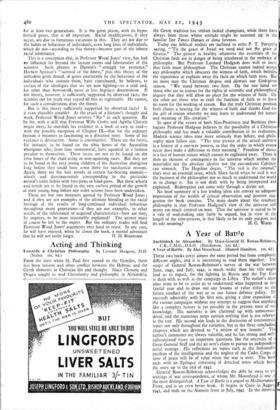Acting' and Thinking
FROM the time when St. Paul first turned to the Gentiles, there has been tension and often conflict between the Hebraic and the Greek elements in Christian life and thought. Since Clement and Origen sought to wed Christianity and philosophy in Alexancliia, the Greek tradition'has seldom lacked champions, while there have always been those whose attitude might be summed up in the familiar line Timeo Danaos et dqrsa ferentes.
Today our biblical realists are inclined to echo P. T. Forsyth's saying, "'Tis the grace of Israel we need and. not the grace of Greece." The protest is healthy whenever the essentials of the Christian faith are in danger of being smothered in the embrace of philosophy. But Professor Leonard Hodgson does well to insist that faith must philosophise. The Christian cannot indeed accept any philosophy which obscures the witness of faith, which belittles the experience or explains away the facts on which faith rests. But no more may the Christian despise and distrust our God-given reason. " We stand between two fires. OD the one hand are those who are so jealous for the rights of scientific and philosophical inquiry that they will allow no place for the witness of faith. On the other are those who so exalt the function of faith as. to leave no room for the working of reason. But the truly Christian position both claims a hearing for the witness.of faith and thanks God for the gift of reason whereby we may learn to understand the nature and meaning of His . creation." In spite of the vetoes of both Neo-Positivists and Barthian theo- logians Professor Hodgson believes in the possibility of a Christian philosophy and has made a valuable contribution to its realisation, Modern science takes time more seriously than before, and philo- sophy must follow suit. " The true picture of the actual universe is a history of a one-way process, so that the order in which events occur does make a difference to their meaning." Freedom of choice is a fact of human nature which cannot be explained away. There is then an element of contingency in the universe which neither the materialist nor the absolute idealist nor the out-and-out Calvinist can stomach. The Hegelian slogan, " The real is the rational," slurs over an essential issue, which Marx faced when he said it was the business of the philosopher not so much to understand the world as to change it. Sin is not dealt with by being interpreted and explained. Redemption can come only through a divine act. No brief summary of a few leading ideas can convey an adequate impression of the wealth of critical observation and positive sug- gestion the book contains. The main doubt about the resultant philosophy is that Professor Hodgson's view of the universe still seems too much centred on man. That the universe is suited to be a vale of soul-making may fairly be argued, but in view of the length of the time-process, is that likely to be its- only purpose and


























 Previous page
Previous page